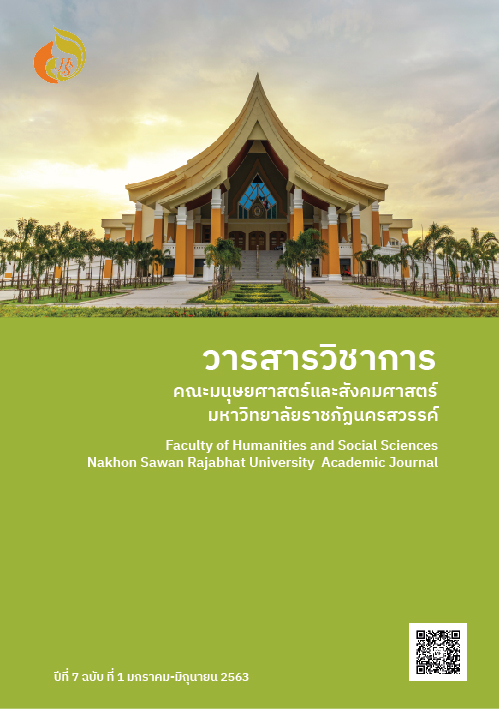การวิเคราะห์งานเขียนรีวิวในเฟซบุ๊กแฟนเพจ TripTH ทริปไทยแลนด์
Main Article Content
บทคัดย่อ
บทความวิจัยเรื่องการวิเคราะห์งานเขียนรีวิวในเฟซบุ๊กแฟนเพจ TripTH ทริปไทยแลนด์ มีวัตถุประสงค์เพื่อศึกษาเนื้อหา กลวิธีการเขียน และการใช้ภาษาในงานเขียนรีวิวของเฟซบุ๊กแฟนเพจ TripTH ทริปไทยแลนด์ โดยเก็บข้อมูลจากงานเขียนรีวิวในเฟซบุ๊กแฟนเพจ TripTH ทริปไทยแลนด์ ที่บล็อกเกอร์เขียนขึ้นตั้งแต่วันที่ 1-29 กุมภาพันธ์ 2563 จำนวน 131 เรื่อง ผลการวิจัยพบว่า เนื้อหาของงานเขียนรีวิวมี 2 ประเภท ได้แก่ เนื้อหาเกี่ยวกับการท่องเที่ยวและเนื้อหาที่ไม่เกี่ยวกับการท่องเที่ยว กลวิธีการเขียนมี 4 องค์ประกอบตามโครงสร้างของสารคดีท่องเที่ยว ได้แก่ การตั้งชื่อเรื่อง การเปิดเรื่อง การเสนอเรื่อง และการปิดเรื่อง การตั้งชื่อเรื่องถือเป็นกลวิธีการเขียนที่โดดเด่นที่สุด มี 6 วิธี เรียงลำดับจากวิธีที่พบมากที่สุดไปน้อยที่สุด ได้แก่ การตั้งชื่อเรื่องตามเอกลักษณ์ของสถานที่ การตั้งชื่อเรื่องตามชื่อสถานที่โดยตรง การตั้งชื่อเรื่องโดยใช้คำที่สื่อความถึงสถานที่ท่องเที่ยว ร้านอาหาร หรือที่พัก การตั้งชื่อเรื่องโดยเล่นสัมผัสคล้องจอง การตั้งชื่อเรื่องโดยใช้คำถาม และการตั้งชื่อตามลักษณะการเดินทาง ส่วนการใช้ภาษามีการใช้คำ การใช้โวหาร การใช้ภาพพจน์ และการใช้เครื่องหมายและอิโมจิ การใช้คำนับเป็นการใช้ภาษาที่โดดเด่นที่สุดมี 12 ลักษณะ เรียงลำดับจากลักษณะที่พบมากที่สุดไปน้อยที่สุด ได้แก่ การใช้คำทับศัพท์ภาษาอังกฤษ การใช้คำขยาย การเปลี่ยนเสียงของคำ การพิมพ์ซ้ำ การใช้คำซ้ำ การใช้คำซ้อน การใช้คำสัมผัส การใช้คำตัด การใช้อักษรย่อ การใช้คำเลียนเสียง การใช้คำสแลง และการใช้คำภาษาถิ่น
Article Details
เอกสารอ้างอิง
กานติภา วรพงศ์. (2548). การใช้ภาษาในเว็บบอร์ดของนักเรียนระดับมัธยมศึกษา (วิทยานิพนธ์ปริญญามหาบัณฑิต). กรุงเทพฯ: มหาวิทยาลัยเกษตรศาสตร์.
เกศราพร มากจันทร์. (2548). การวิเคราะห์สารคดีท่องเที่ยวสาธารณรัฐประชาชนจีน พระราชนิพนธ์สมเด็จพระเทพรัตนราชสุดาฯ สยามบรมราชกุมารี (วิทยานิพนธ์ปริญญามหาบัณฑิต). นครปฐม: มหาวิทยาลัยศิลปากร.
จุไรรัตน์ ลักษณะศิริและบาหยัน อิ่มสำราญ, บรรณาธิการ. (2548). ภาษากับการสื่อสาร. กรุงเทพฯ: บี.เพรส.
ชญานี รัตนรอด. (2550). การใช้ภาษาและกลวิธีการเขียนสารคดีท่องเที่ยวในอนุสาร อ.ส.ท. (วิทยานิพนธ์ปริญญามหาบัณฑิต). กรุงเทพฯ: มหาวิทยาลัยเกษตรศาสตร์.
ดวงเนตร์ มีแย้ม. (2544). การศึกษาพัฒนาการของการเขียนสารคดีท่องเที่ยวต่างประเทศ ตั้งแต่ปีพุทธศักราช 2475 จนถึงพุทธศักราช 2540 (วิทยานิพนธ์ปริญญามหาบัณฑิต). นครปฐม: มหาวิทยาลัยศิลปากร.
ณรงค์ยศ มหิทธิวาณิชชา. (2563). สถิติและพฤติกรรมการใช้ social media ทั่วโลก Q1 ปี 2020. สืบค้น 20 มีนาคม 2563, จาก https://www.twfdigital.com/blog/2020/02/global-social-media-usage-stats-q1-2020/
ธัญญา สังขพันธานนท์. (2548). การเขียนสารคดีภาคปฏิบัติ. กรุงเทพฯ : มหาวิทยาลัยมหาสารคาม.
มนธิชา ก้องวุฒิเวชและปณิธาน บรรณาธรรม. (2562). การใช้ภาษาในสติ๊กเกอร์ไลน์. ใน การประชุมวิชาการนำเสนอผลงานวิจัยระดับชาติของนักศึกษาด้านมนุษย์ศาสตร์และสังคมศาสตร์ ครั้งที่ 2 คณะมนุษยศาสตร์และสังคมศาสตร์ มหาวิทยาลัยราชภัฏสวนสุนันทา (71-82). กรุงเทพฯ: มหาวิทยาลัยราชภัฏสวนสุนันทา.
มาลี บุญศิริพันธ์. (2535). การเขียนสารคดีสำหรับสื่อสิ่งพิมพ์. พิมพ์ครั้งที่ 2. กรุงเทพฯ: ประกายพรึก.
อมรา ประสิทธิ์รัฐสินธุ์. (2540). ภาษาในสังคมไทย: ความหลากหลาย การเปลี่ยนแปลง และการพัฒนา. กรุงเทพฯ: โรงพิมพ์จุฬาลงกรณ์มหาวิทยาลัย.
อรรถรณ บาหยัน. (2559). ประสิทธิผลการสื่อสารของแฟนเพจรีวิวภาพยนตร์บนสื่อเฟซบุ๊ก . (วิทยานิพนธ์ปริญญามหาบัณฑิต). กรุงเทพฯ: จุฬาลงกรณมหาวิทยาลัย.
อุดม วโรตม์สิกขดิตถ์. (2537). ภาษาศาสตร์เหมาะสมัยเบื้องต้น. กรุงเทพฯ: ต้นธรรม.
Forbes Thailand. (2019). 10 สุดยอด “Online Influencers” ประเทศไทย ปี 2562. สืบค้น 20 มีนาคม 2563, จาก https://forbesthailand.com/leaderboard/thailand-leaderboard/online-influencers
Simon Kemp. (2020). Digital 2020: Global Digital Overview. สืบค้น 20 มีนาคม 2563, จาก https://datareportal.com/reports/digital-2020-global-digital-overview


